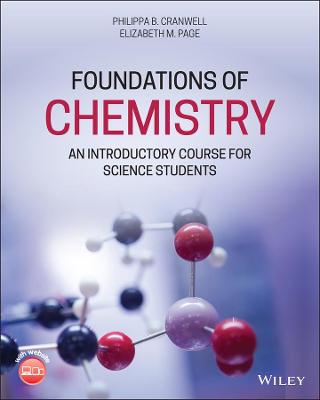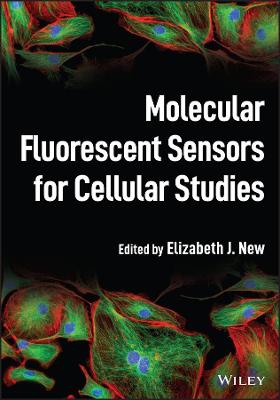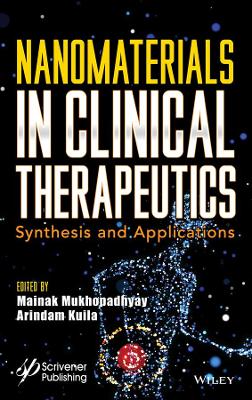Foundations of Chemistry
 -15%
portes grátis
-15%
portes grátis
Foundations of Chemistry
An Introductory Course for Science Students
Page, Elizabeth M.; Cranwell, Philippa B.
John Wiley & Sons Inc
08/2021
592
Mole
Inglês
9781119513872
15 a 20 dias
1344
Descrição não disponível.
Chapter 0: Fundamentals
0.1 Measurement in chemistry and science - SI units
0.2 Expressing large and small numbers using scientific notation
0.3 Using metric prefixes
0.4 Significant figures
0.5 Calculations using scientific notation
0.6 Writing chemical formulae and equations
Quick Check Summary
Chapter 1: Atomic Structure
1.1 Atomic Structure
1.2 Electronic Structure
Quick Check Summary
Chapter 2: Chemical Bonding
2.1 Bonding
2.2 Valence Shell Electron Pair Repulsion Theory (VSEPR)
2.3 Polar bonds and polar molecules
2.4 Intermolecular forces
Quick Check Summary
Chapter 3 Masses of atoms, molecules and reacting substances
3.1 Masses of atoms and molecules
3.2 Amount of substance
3.3 Calculations with moles
3.4 Solutions; concentrations and dilutions
3.5 Titration calculations
3.6 Calculations with gas volumes
Quick Check Summary
Chapter 4: States of Matter
Introduction
4.1 Solids
4.2 Liquids
4.3 Gases
Quick Check Summary
Chapter 5 Oxidation-reduction (redox) reactions
5.1 Redox Reactions
5.2 Disproportionation Reactions
5.3 Redox titrations
Quick Check Summary
Chapter 6 Energy, Enthalpy and Entropy
6.1 Enthalpy Changes
6.2 Entropy and Gibbs Free Energy
Quick Check Summary
Chapter 7 Chemical Equilibrium and Acid-Base Equilibria
Introduction
7.1 Equilibria and reversible reactions
7.2 Acid - base equilibria
Quick Check Summary
Chapter 8 Chemical Kinetics - The Rates of Chemical Reactions
Introduction
8.1 The rate of reaction
8.2 Determining the rate of a chemical reaction
8.3 The rate expression
8.4 The half-life of a reaction
8.5 Reaction mechanisms
8.6 Effect of temperature on reaction rate
Quick Check Summary
Chapter 9 Electrochemistry
Introduction
9.1 Redox reactions - a reminder
9.2 Redox reactions and electrochemical cells
9.3 Using redox reactions - Galvanic cells
9.4 Using redox reactions - Electrolytic cells
Quick Check Summary
Chapter 10: Group trends and periodicity
10.1 The Periodic Table: Periods, Groups and Periodicity
10.2 Trends in properties of elements in the same vertical group of the periodic table
10.3 Trends in properties of elements in the same horizontal period
Quick Check Summary
Chapter 11: The Periodic Table - chemistry of Groups 1, 2, 7 and transition elements
Introduction
11.1 Group 1 - The Alkali Metals
11.2 Group 2 - The Alkaline Earth Metals
11.3 Group 7 (17) The Halogens
11.4 The Transition Elements
Quick Check Summary
Chapter 12: Core Concepts and Ideas Within Organic Chemistry
12.1 Types of molecular formula
12.2 Nomenclature of simple alkanes
12.3 Isomers
12.4 Drawing Reaction Mechanisms
12.5 Types of reaction
Quick Check Summary
Chapter 13: Alkanes, Alkenes and Alkynes
13.1 Alkanes: an outline
13.2 Alkenes: an outline
13.3 Alkynes: an outline
Quick Check Summary
Chapter 14: Reactivity of Selected Homologous Series
14.1 Alcohols
14.2 Aldehydes and ketones
14.3 Carboxylic acids
14.4 Esters
14.5 Amides
14.6 Amines
14.7 Nitriles
Quick Check Summary
Chapter 15: The Chemistry of Aromatic Compounds
15.1 Benzene
15.2 Reactions of benzene with electrophiles
15.3 Aniline
Quick Check Summary
Chapter 16: Substitution and elimination reactions
16.1 Substitution reactions
16.2 Elimination reactions
16.3 Comparison of substitution and elimination reactions
Quick Check Summary
Chapter 17: Bringing it all together
17.1 Functional group interconversion
17.2 Bringing it all together
Chapter 18: Polymerisation
18.1 Polymerisation
Quick Check Summary
Chapter 19: Spectroscopy
19.1 Mass Spectrometry
19.2 Infrared Spectroscopy (IR)
19.3 Nuclear Magnetic Resonance Spectroscopy (NMR)
19.4 Bringing it all together
Quick Check Summary
0.1 Measurement in chemistry and science - SI units
0.2 Expressing large and small numbers using scientific notation
0.3 Using metric prefixes
0.4 Significant figures
0.5 Calculations using scientific notation
0.6 Writing chemical formulae and equations
Quick Check Summary
Chapter 1: Atomic Structure
1.1 Atomic Structure
1.2 Electronic Structure
Quick Check Summary
Chapter 2: Chemical Bonding
2.1 Bonding
2.2 Valence Shell Electron Pair Repulsion Theory (VSEPR)
2.3 Polar bonds and polar molecules
2.4 Intermolecular forces
Quick Check Summary
Chapter 3 Masses of atoms, molecules and reacting substances
3.1 Masses of atoms and molecules
3.2 Amount of substance
3.3 Calculations with moles
3.4 Solutions; concentrations and dilutions
3.5 Titration calculations
3.6 Calculations with gas volumes
Quick Check Summary
Chapter 4: States of Matter
Introduction
4.1 Solids
4.2 Liquids
4.3 Gases
Quick Check Summary
Chapter 5 Oxidation-reduction (redox) reactions
5.1 Redox Reactions
5.2 Disproportionation Reactions
5.3 Redox titrations
Quick Check Summary
Chapter 6 Energy, Enthalpy and Entropy
6.1 Enthalpy Changes
6.2 Entropy and Gibbs Free Energy
Quick Check Summary
Chapter 7 Chemical Equilibrium and Acid-Base Equilibria
Introduction
7.1 Equilibria and reversible reactions
7.2 Acid - base equilibria
Quick Check Summary
Chapter 8 Chemical Kinetics - The Rates of Chemical Reactions
Introduction
8.1 The rate of reaction
8.2 Determining the rate of a chemical reaction
8.3 The rate expression
8.4 The half-life of a reaction
8.5 Reaction mechanisms
8.6 Effect of temperature on reaction rate
Quick Check Summary
Chapter 9 Electrochemistry
Introduction
9.1 Redox reactions - a reminder
9.2 Redox reactions and electrochemical cells
9.3 Using redox reactions - Galvanic cells
9.4 Using redox reactions - Electrolytic cells
Quick Check Summary
Chapter 10: Group trends and periodicity
10.1 The Periodic Table: Periods, Groups and Periodicity
10.2 Trends in properties of elements in the same vertical group of the periodic table
10.3 Trends in properties of elements in the same horizontal period
Quick Check Summary
Chapter 11: The Periodic Table - chemistry of Groups 1, 2, 7 and transition elements
Introduction
11.1 Group 1 - The Alkali Metals
11.2 Group 2 - The Alkaline Earth Metals
11.3 Group 7 (17) The Halogens
11.4 The Transition Elements
Quick Check Summary
Chapter 12: Core Concepts and Ideas Within Organic Chemistry
12.1 Types of molecular formula
12.2 Nomenclature of simple alkanes
12.3 Isomers
12.4 Drawing Reaction Mechanisms
12.5 Types of reaction
Quick Check Summary
Chapter 13: Alkanes, Alkenes and Alkynes
13.1 Alkanes: an outline
13.2 Alkenes: an outline
13.3 Alkynes: an outline
Quick Check Summary
Chapter 14: Reactivity of Selected Homologous Series
14.1 Alcohols
14.2 Aldehydes and ketones
14.3 Carboxylic acids
14.4 Esters
14.5 Amides
14.6 Amines
14.7 Nitriles
Quick Check Summary
Chapter 15: The Chemistry of Aromatic Compounds
15.1 Benzene
15.2 Reactions of benzene with electrophiles
15.3 Aniline
Quick Check Summary
Chapter 16: Substitution and elimination reactions
16.1 Substitution reactions
16.2 Elimination reactions
16.3 Comparison of substitution and elimination reactions
Quick Check Summary
Chapter 17: Bringing it all together
17.1 Functional group interconversion
17.2 Bringing it all together
Chapter 18: Polymerisation
18.1 Polymerisation
Quick Check Summary
Chapter 19: Spectroscopy
19.1 Mass Spectrometry
19.2 Infrared Spectroscopy (IR)
19.3 Nuclear Magnetic Resonance Spectroscopy (NMR)
19.4 Bringing it all together
Quick Check Summary
Este título pertence ao(s) assunto(s) indicados(s). Para ver outros títulos clique no assunto desejado.
Introduction to chemistry; understanding chemistry; introductory text to chemistry; chemistry for science students; foundation to chemistry; chemistry text; theory of chemistry; principles of chemistry; key concepts of chemistry; guide to chemistry
Chapter 0: Fundamentals
0.1 Measurement in chemistry and science - SI units
0.2 Expressing large and small numbers using scientific notation
0.3 Using metric prefixes
0.4 Significant figures
0.5 Calculations using scientific notation
0.6 Writing chemical formulae and equations
Quick Check Summary
Chapter 1: Atomic Structure
1.1 Atomic Structure
1.2 Electronic Structure
Quick Check Summary
Chapter 2: Chemical Bonding
2.1 Bonding
2.2 Valence Shell Electron Pair Repulsion Theory (VSEPR)
2.3 Polar bonds and polar molecules
2.4 Intermolecular forces
Quick Check Summary
Chapter 3 Masses of atoms, molecules and reacting substances
3.1 Masses of atoms and molecules
3.2 Amount of substance
3.3 Calculations with moles
3.4 Solutions; concentrations and dilutions
3.5 Titration calculations
3.6 Calculations with gas volumes
Quick Check Summary
Chapter 4: States of Matter
Introduction
4.1 Solids
4.2 Liquids
4.3 Gases
Quick Check Summary
Chapter 5 Oxidation-reduction (redox) reactions
5.1 Redox Reactions
5.2 Disproportionation Reactions
5.3 Redox titrations
Quick Check Summary
Chapter 6 Energy, Enthalpy and Entropy
6.1 Enthalpy Changes
6.2 Entropy and Gibbs Free Energy
Quick Check Summary
Chapter 7 Chemical Equilibrium and Acid-Base Equilibria
Introduction
7.1 Equilibria and reversible reactions
7.2 Acid - base equilibria
Quick Check Summary
Chapter 8 Chemical Kinetics - The Rates of Chemical Reactions
Introduction
8.1 The rate of reaction
8.2 Determining the rate of a chemical reaction
8.3 The rate expression
8.4 The half-life of a reaction
8.5 Reaction mechanisms
8.6 Effect of temperature on reaction rate
Quick Check Summary
Chapter 9 Electrochemistry
Introduction
9.1 Redox reactions - a reminder
9.2 Redox reactions and electrochemical cells
9.3 Using redox reactions - Galvanic cells
9.4 Using redox reactions - Electrolytic cells
Quick Check Summary
Chapter 10: Group trends and periodicity
10.1 The Periodic Table: Periods, Groups and Periodicity
10.2 Trends in properties of elements in the same vertical group of the periodic table
10.3 Trends in properties of elements in the same horizontal period
Quick Check Summary
Chapter 11: The Periodic Table - chemistry of Groups 1, 2, 7 and transition elements
Introduction
11.1 Group 1 - The Alkali Metals
11.2 Group 2 - The Alkaline Earth Metals
11.3 Group 7 (17) The Halogens
11.4 The Transition Elements
Quick Check Summary
Chapter 12: Core Concepts and Ideas Within Organic Chemistry
12.1 Types of molecular formula
12.2 Nomenclature of simple alkanes
12.3 Isomers
12.4 Drawing Reaction Mechanisms
12.5 Types of reaction
Quick Check Summary
Chapter 13: Alkanes, Alkenes and Alkynes
13.1 Alkanes: an outline
13.2 Alkenes: an outline
13.3 Alkynes: an outline
Quick Check Summary
Chapter 14: Reactivity of Selected Homologous Series
14.1 Alcohols
14.2 Aldehydes and ketones
14.3 Carboxylic acids
14.4 Esters
14.5 Amides
14.6 Amines
14.7 Nitriles
Quick Check Summary
Chapter 15: The Chemistry of Aromatic Compounds
15.1 Benzene
15.2 Reactions of benzene with electrophiles
15.3 Aniline
Quick Check Summary
Chapter 16: Substitution and elimination reactions
16.1 Substitution reactions
16.2 Elimination reactions
16.3 Comparison of substitution and elimination reactions
Quick Check Summary
Chapter 17: Bringing it all together
17.1 Functional group interconversion
17.2 Bringing it all together
Chapter 18: Polymerisation
18.1 Polymerisation
Quick Check Summary
Chapter 19: Spectroscopy
19.1 Mass Spectrometry
19.2 Infrared Spectroscopy (IR)
19.3 Nuclear Magnetic Resonance Spectroscopy (NMR)
19.4 Bringing it all together
Quick Check Summary
0.1 Measurement in chemistry and science - SI units
0.2 Expressing large and small numbers using scientific notation
0.3 Using metric prefixes
0.4 Significant figures
0.5 Calculations using scientific notation
0.6 Writing chemical formulae and equations
Quick Check Summary
Chapter 1: Atomic Structure
1.1 Atomic Structure
1.2 Electronic Structure
Quick Check Summary
Chapter 2: Chemical Bonding
2.1 Bonding
2.2 Valence Shell Electron Pair Repulsion Theory (VSEPR)
2.3 Polar bonds and polar molecules
2.4 Intermolecular forces
Quick Check Summary
Chapter 3 Masses of atoms, molecules and reacting substances
3.1 Masses of atoms and molecules
3.2 Amount of substance
3.3 Calculations with moles
3.4 Solutions; concentrations and dilutions
3.5 Titration calculations
3.6 Calculations with gas volumes
Quick Check Summary
Chapter 4: States of Matter
Introduction
4.1 Solids
4.2 Liquids
4.3 Gases
Quick Check Summary
Chapter 5 Oxidation-reduction (redox) reactions
5.1 Redox Reactions
5.2 Disproportionation Reactions
5.3 Redox titrations
Quick Check Summary
Chapter 6 Energy, Enthalpy and Entropy
6.1 Enthalpy Changes
6.2 Entropy and Gibbs Free Energy
Quick Check Summary
Chapter 7 Chemical Equilibrium and Acid-Base Equilibria
Introduction
7.1 Equilibria and reversible reactions
7.2 Acid - base equilibria
Quick Check Summary
Chapter 8 Chemical Kinetics - The Rates of Chemical Reactions
Introduction
8.1 The rate of reaction
8.2 Determining the rate of a chemical reaction
8.3 The rate expression
8.4 The half-life of a reaction
8.5 Reaction mechanisms
8.6 Effect of temperature on reaction rate
Quick Check Summary
Chapter 9 Electrochemistry
Introduction
9.1 Redox reactions - a reminder
9.2 Redox reactions and electrochemical cells
9.3 Using redox reactions - Galvanic cells
9.4 Using redox reactions - Electrolytic cells
Quick Check Summary
Chapter 10: Group trends and periodicity
10.1 The Periodic Table: Periods, Groups and Periodicity
10.2 Trends in properties of elements in the same vertical group of the periodic table
10.3 Trends in properties of elements in the same horizontal period
Quick Check Summary
Chapter 11: The Periodic Table - chemistry of Groups 1, 2, 7 and transition elements
Introduction
11.1 Group 1 - The Alkali Metals
11.2 Group 2 - The Alkaline Earth Metals
11.3 Group 7 (17) The Halogens
11.4 The Transition Elements
Quick Check Summary
Chapter 12: Core Concepts and Ideas Within Organic Chemistry
12.1 Types of molecular formula
12.2 Nomenclature of simple alkanes
12.3 Isomers
12.4 Drawing Reaction Mechanisms
12.5 Types of reaction
Quick Check Summary
Chapter 13: Alkanes, Alkenes and Alkynes
13.1 Alkanes: an outline
13.2 Alkenes: an outline
13.3 Alkynes: an outline
Quick Check Summary
Chapter 14: Reactivity of Selected Homologous Series
14.1 Alcohols
14.2 Aldehydes and ketones
14.3 Carboxylic acids
14.4 Esters
14.5 Amides
14.6 Amines
14.7 Nitriles
Quick Check Summary
Chapter 15: The Chemistry of Aromatic Compounds
15.1 Benzene
15.2 Reactions of benzene with electrophiles
15.3 Aniline
Quick Check Summary
Chapter 16: Substitution and elimination reactions
16.1 Substitution reactions
16.2 Elimination reactions
16.3 Comparison of substitution and elimination reactions
Quick Check Summary
Chapter 17: Bringing it all together
17.1 Functional group interconversion
17.2 Bringing it all together
Chapter 18: Polymerisation
18.1 Polymerisation
Quick Check Summary
Chapter 19: Spectroscopy
19.1 Mass Spectrometry
19.2 Infrared Spectroscopy (IR)
19.3 Nuclear Magnetic Resonance Spectroscopy (NMR)
19.4 Bringing it all together
Quick Check Summary
Este título pertence ao(s) assunto(s) indicados(s). Para ver outros títulos clique no assunto desejado.







